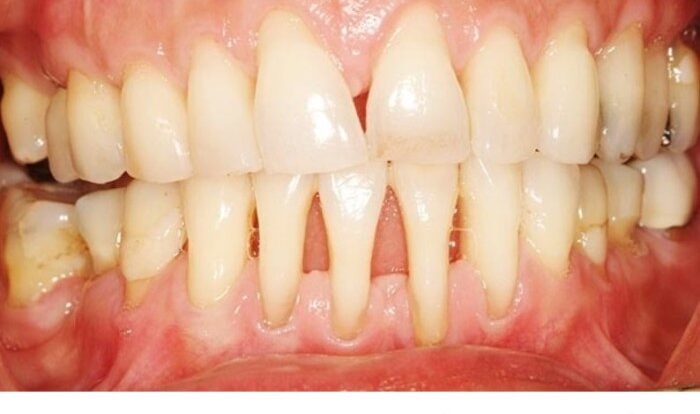
How to cure gum disease without a dentist – Gum disease is a common problem that can lead to serious health issues if left untreated. Fortunately, there are a number of things you can do at home to cure gum disease without a dentist. In this guide, we’ll discuss the best natural remedies, home care techniques, dietary modifications, lifestyle changes, and alternative therapies for gum disease.
By following the advice in this guide, you can improve your gum health and prevent gum disease from coming back.
Natural Remedies for Gum Disease
Gum disease is a common problem that can lead to serious health issues if left untreated. While traditional dental treatments are effective, they can be expensive and time-consuming. Fortunately, there are a number of natural remedies that can help to improve gum health and prevent or treat gum disease.
Salt Water Rinses
Salt water rinses are a simple and effective way to reduce inflammation and kill bacteria in the mouth. To make a salt water rinse, dissolve 1/2 teaspoon of salt in 8 ounces of warm water. Rinse your mouth with the salt water for 30 seconds, then spit it out.
Repeat several times a day.
If you’re looking to cure gum disease without breaking the bank, there are some things you can do. You can try using a saltwater rinse, which can help to reduce inflammation and kill bacteria. You can also try using a hydrogen peroxide rinse, which can help to whiten your teeth and kill bacteria.
If these methods don’t work, you may want to consider visiting Nassau Mecconline for more information on how to cure gum disease without a dentist.
If you’re dealing with gum disease, there are several natural remedies you can try before resorting to a dentist. From using a saltwater rinse to applying a turmeric paste, there are many ways to alleviate the symptoms of gum disease without a dentist.
To learn more about these natural remedies, check out this helpful guide: how to cure gum disease without a dentist . With a little patience and consistency, you may be able to cure your gum disease without ever having to see a dentist.
Turmeric
Turmeric is a spice that has been used for centuries to treat a variety of health conditions, including gum disease. Turmeric contains curcumin, a compound that has anti-inflammatory and antibacterial properties. To use turmeric for gum disease, mix 1/2 teaspoon of turmeric powder with a little water to form a paste.
Apply the paste to your gums and leave it on for 10 minutes, then rinse your mouth with warm water.
Gum disease is a common problem that can lead to serious health issues if left untreated. While it’s important to see a dentist for regular checkups and cleanings, there are also some things you can do at home to help prevent and treat gum disease.
If you’re looking for ways to cure gum disease without a dentist, there are a few things you can try. Click here to learn more about how to cure gum disease without a dentist. It’s important to note that these methods are not a substitute for professional dental care, but they can help to improve your oral health and prevent gum disease from getting worse.
Tea Tree Oil
Tea tree oil is an essential oil that has antibacterial and antifungal properties. To use tea tree oil for gum disease, add a few drops of tea tree oil to a cup of warm water and rinse your mouth with the solution for 30 seconds, then spit it out.
Repeat several times a day.
Home Care Techniques: How To Cure Gum Disease Without A Dentist
Effective home care is crucial for preventing and managing gum disease. Implementing proper oral hygiene practices can help maintain healthy gums and reduce the risk of gum inflammation and infection.
Proper Brushing and Flossing Techniques
Regular brushing and flossing are essential for removing plaque and bacteria from teeth and gums. Here’s how to perform these techniques effectively:
- Brushing:Use a soft-bristled toothbrush and brush twice a day for two minutes. Angle the brush at a 45-degree angle to the gum line and make gentle circular motions.
- Flossing:Floss at least once a day to remove plaque and bacteria from between teeth, where a toothbrush can’t reach. Gently guide the floss between teeth and curve it around the base of each tooth.
Importance of Antimicrobial Mouthwashes and Dental Floss
Antimicrobial mouthwashes and dental floss can help reduce bacteria in the mouth and prevent gum disease. Antimicrobial mouthwashes contain ingredients that kill bacteria, while dental floss removes plaque and food particles from between teeth.
Step-by-Step Guide to Effective Home Care
- Brush twice a day:Brush your teeth for two minutes each time, using a soft-bristled toothbrush and a fluoride toothpaste.
- Floss once a day:Use dental floss to remove plaque and food particles from between your teeth.
- Use antimicrobial mouthwash:Rinse your mouth with an antimicrobial mouthwash twice a day to kill bacteria and reduce inflammation.
- Visit your dentist regularly:Get professional cleanings and checkups every six months to remove tartar and plaque that home care can’t reach.
Dietary Modifications
Maintaining a healthy diet is crucial for overall well-being, including gum health. Certain foods and nutrients play a significant role in preventing and improving gum disease.
Vitamins, minerals, and antioxidants are essential nutrients that contribute to gum health. Vitamin C, for instance, is a powerful antioxidant that helps protect gums from damage caused by free radicals. Calcium and phosphorus are vital for strong teeth and bones, while vitamin D aids in calcium absorption.
Foods to Include
- Fruits and vegetables:Rich in vitamins, minerals, and antioxidants, fruits and vegetables support gum health. Berries, citrus fruits, leafy greens, and carrots are particularly beneficial.
- Dairy products:Calcium-rich dairy products like milk, cheese, and yogurt help strengthen teeth and bones, indirectly supporting gum health.
- Lean protein:Lean protein sources such as fish, poultry, and beans provide essential amino acids for tissue repair and maintenance.
- Green tea:Green tea contains polyphenols, antioxidants that have anti-inflammatory properties and may help reduce gum inflammation.
Foods to Limit
- Sugary foods and drinks:Sugar feeds harmful bacteria in the mouth, contributing to plaque formation and gum disease.
- Acidic foods:Acidic foods like citrus fruits and vinegar can erode tooth enamel and irritate gums.
- Sticky foods:Sticky foods like candy and dried fruit can adhere to teeth and provide a breeding ground for bacteria.
- Alcohol:Excessive alcohol consumption can dehydrate the mouth and reduce saliva production, increasing the risk of gum disease.
Sample Meal Plan
Here’s a sample meal plan that incorporates foods beneficial for gum health:
- Breakfast:Oatmeal with berries and nuts
- Lunch:Grilled chicken salad with leafy greens, vegetables, and low-fat dressing
- Dinner:Salmon with roasted vegetables and brown rice
- Snacks:Apple slices with peanut butter, carrot sticks with hummus
By incorporating these dietary modifications into your lifestyle, you can support gum health and reduce the risk of gum disease.
Lifestyle Changes

Lifestyle factors significantly impact gum health. Understanding and implementing positive lifestyle changes can play a crucial role in preventing and managing gum disease.
This section explores the impact of smoking, stress, and sleep on gum disease and provides strategies to improve gum health by addressing these factors.
Smoking
- Smoking is a major risk factor for gum disease. The chemicals in cigarettes damage the gum tissue, making it more susceptible to infection.
- Quitting smoking is the single most effective way to improve gum health. Support groups, nicotine replacement therapy, and counseling can assist in quitting.
Stress
Chronic stress can weaken the immune system, making the body more vulnerable to gum disease. Stress can also lead to unhealthy coping mechanisms like smoking or poor oral hygiene.
- Engage in stress-reducing activities such as exercise, yoga, or meditation.
- Seek professional help if stress becomes overwhelming.
Sleep
Getting enough sleep is essential for overall health, including gum health. Sleep deprivation can impair the immune system and reduce the body’s ability to fight infection.
To get rid of gum disease without a dentist, there are many at-home remedies you can try. You can try oil pulling, which involves swishing oil in your mouth for 20 minutes each day. Click here to learn more about curing gum disease without a dentist.
You can also try rinsing your mouth with salt water or using a mouthwash that contains chlorhexidine. If these remedies don’t work, you may need to see a dentist for professional treatment.
- Aim for 7-9 hours of quality sleep each night.
- Establish a regular sleep-wake cycle, even on weekends.
Alternative Therapies
In addition to conventional treatments, alternative therapies may provide complementary support for managing gum disease. These therapies aim to address the underlying causes of gum inflammation and promote oral health.
Gum disease is a common problem that can lead to serious health issues if left untreated. While it’s always best to see a dentist for professional treatment, there are some things you can do at home to help cure gum disease without a dentist.
Click here to learn more about how to cure gum disease without a dentist and improve your oral health.
Acupuncture
Acupuncture involves inserting thin needles into specific points on the body to stimulate energy flow and promote healing. For gum disease, acupuncture may help reduce inflammation, improve blood circulation to the gums, and enhance the body’s natural immune response.
Herbal Remedies, How to cure gum disease without a dentist
Certain herbs possess anti-inflammatory, antibacterial, and antioxidant properties that can benefit gum health. Examples include green tea, turmeric, and aloe vera. These herbs can be consumed as teas, supplements, or applied topically to the gums.
Yoga
Yoga incorporates physical postures, breathing exercises, and meditation. Regular yoga practice can help reduce stress, which is a known contributing factor to gum disease. Additionally, yoga postures that focus on the head and neck may improve blood flow to the gums and promote relaxation.
Summary
Gum disease is a serious problem, but it can be cured with the right treatment. By following the advice in this guide, you can improve your gum health and prevent gum disease from coming back.
FAQ Compilation
Can gum disease be cured without a dentist?
Yes, gum disease can be cured without a dentist if it is caught early and treated properly. However, if gum disease is severe, you may need to see a dentist for professional treatment.
What are the best natural remedies for gum disease?
Some of the best natural remedies for gum disease include salt water rinses, turmeric, and tea tree oil. These remedies can help to reduce inflammation, kill bacteria, and promote healing.
What are the best home care techniques for gum disease?
The best home care techniques for gum disease include brushing your teeth twice a day, flossing daily, and using an antimicrobial mouthwash. These techniques can help to remove plaque and bacteria from your teeth and gums.
What are the best dietary modifications for gum disease?
The best dietary modifications for gum disease include eating a healthy diet that is rich in fruits, vegetables, and whole grains. These foods can help to strengthen your immune system and promote healing.
What are the best lifestyle changes for gum disease?
The best lifestyle changes for gum disease include quitting smoking, reducing stress, and getting enough sleep. These changes can help to improve your overall health and well-being, which can lead to better gum health.





